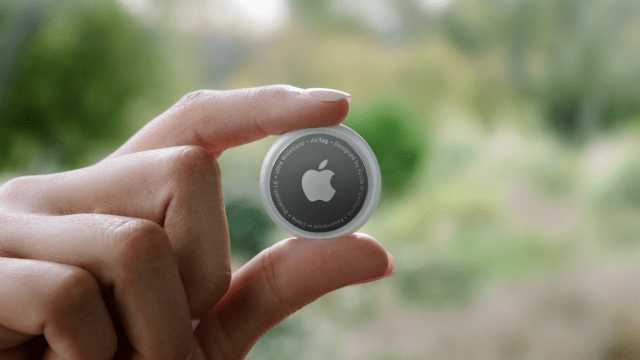Apple’s long-rumoured Bluetooth trackers, AirTags, are now officially here. Finally.
AirTags are little round tiles that look similar to backgammon pieces, but larger. You attach them to your keys, wallet, anything you’re afraid of losing. (Apple has its own accessories for that, too!) In the event you do lose something with an AirTag stuck to it, you’ll be able to recover it using the Find My app, like the way you’d find the last known location of your iPhone or MacBook. And like similar devices such as Tile and Samsung’s SmartTags, AirTags use Bluetooth connectivity to connect to your phone, plus they have a lengthy range in terms of how far they can be tracked.
If you lose an item that has an AirTag stuck to it, a notification will pop up on your iPhone. From there, tap the designated button to make the AirTag chime loudly so you can locate it easily. Apple calls this Precision Fiding. If you don’t hear a chime, it’s possible that the lost device or accessory is not nearby, but you can still locate it with Lost Mode. If another iPhone user comes across your AirTagged item, you’ll receive a notification when that happens. The person who came across your item will receive an alert on their phone as well with your contact information so they (hopefully) call you to return your item.
While these types of tracking devices are not exactly new, it could be beneficial for those who routinely misplace items, or if you’re someone who worries about having your device stolen. (Although it’s not clear how easily an AirTag can be ripped off from a device after it’s stuck on there.)
We’ve been hearing about AirTags since [checks notes] all the way back in 2019, but now that Apple has added third-party support for its Find My platform, it seems less likely that the company could be accused of attempting to kill competing trackers from Tile, Samsung, and other companies.
Like many devices these days, there are potentially some major privacy concerns with AirTags. If these AirTags can stick to anything, then it’s feasible they can stick to a car or the inside of a purse to track a person. For individuals with abusive partners, AirTags could serve as a way to more tightly control that person.
However, Apple says it’s addressing those concerns by implementing safety features that allows users to not share their location with anyone, including Apple itself.
A single AirTag will cost you $45, while a four-pack of AirTags is just $149, and will be available on April 30.
